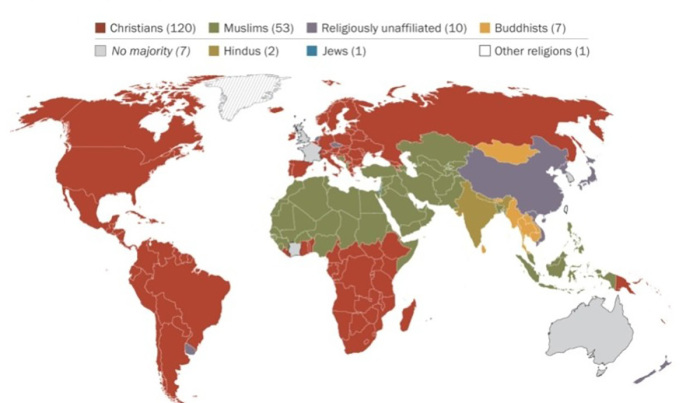UK, Australia, France and Uruguay no longer majority Christian

The number of countries with Christian majorities declined between 2010 and 2020, according to a new report by the Pew Research Center, highlighting a notable shift in global religious affiliation.
As of 2020, Christians remained the majority in 120 out of 201 countries and territories analyzed, down from 124 in 2010. That means Christian-majority nations accounted for 60% of all countries surveyed, compared to 62% a decade earlier. The decline is largely attributed to a growing number of people leaving Christianity, contributing to the rise of religiously unaffiliated populations in multiple nations.
The most significant changes occurred in the United Kingdom, Australia, France and Uruguay — all of which lost their Christian majorities during the 10-year span. In these nations, the share of people identifying as Christian fell below 50%, while the percentage of religiously unaffiliated individuals rose substantially.
Uruguay became the only country in the Americas without a Christian majority by 2020, with 52% of its population identifying as religiously unaffiliated and only 44% as Christian. In the U.K., Australia and France, no single religious group held a majority. However, unaffiliated populations approached or surpassed the number of Christians, reflecting broader secularization trends.
Two other countries — New Zealand and the Netherlands — also transitioned to religiously unaffiliated majorities during the same period, joining a group of seven nations that already held that status in 2010: China, North Korea, the Czech Republic, Hong Kong, Vietnam, Macao and Japan.
In total, Pew found that 10 countries had religiously unaffiliated majorities by 2020, up from seven in 2010. These populations include individuals who identify as atheist, agnostic or “nothing in particular.”

The report noted that while Christianity remains the most geographically widespread religion, its proportion of the global population is smaller than the share of countries where Christians form the majority. In 2020, Christians represented 29% of the world’s population but were the majority in 60% of countries. This contrast reflects Christianity’s broad dispersion across both large and small nations — from the United States and the Philippines to smaller nations like Micronesia.
By comparison, other major world religions such as Hinduism and Islam had majority populations in fewer countries, more closely aligned with their share of the global population. Hindus, who made up 15% of the world’s population, held majorities in just two countries: India and Nepal. Muslims were the majority in 53 countries, and Buddhists in seven.
The number of countries with no clear religious majority also increased slightly, rising from six in 2010 to seven in 2020. These included South Korea, Singapore, Ivory Coast, and Mauritius, along with the UK, Australia and France — countries that had lost their Christian majorities during the decade.
The findings reflect a growing global trend toward religious disaffiliation, particularly in traditionally Christian countries. Pew’s data suggests that while Christianity remains numerically widespread, its cultural and institutional influence is declining in some parts of the world.
The report is based on population data and estimates of religious affiliation collected from a wide range of sources, reflecting a broad demographic overview of global religious change.
This article was originally published at Christian Daily International
Christian Daily International provides biblical, factual and personal news, stories and perspectives from every region, focusing on religious freedom, holistic mission and other issues relevant for the global Church today.


















